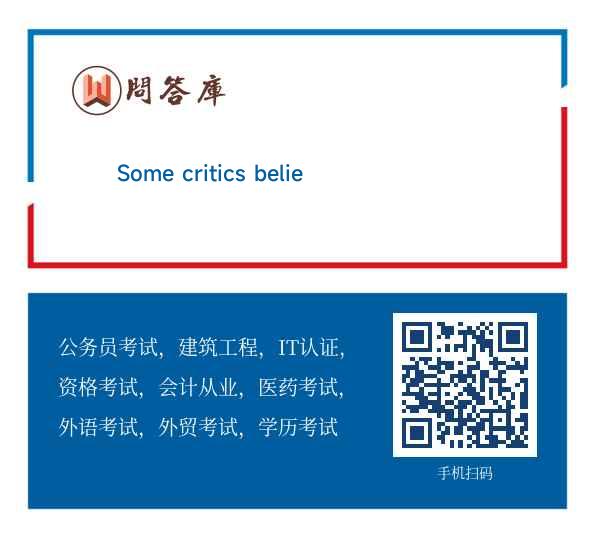Some critics believe that the very concept of
问题详情
Some critics believe that the very concept of intellectual property is mistaken. Unlike physical property, ideas are non-rivalrous goods that can be used by many people at the same time without making them any less useful. The term "intellectual property" was widely adopted only in the 1960s, as a way to bundle trademarks, copyrights and patents. Those critics argue that today"s rights are too strict and make the sharing of knowledge too expensive.
The paradox about intellectual property in IT and telecommunications is that it eases the exchange of technology and acts as a bottleneck for innovation at the same time. The whole system is in a stage of transformation. "Markets require institutions, and institutions take a long time to develop. Today, the institutions for a "market for technology" are not well developed, and it is costly to use this market," says a specialist.
Ideas are to the information age what the physical environment was to the industrial one: the raw material of economic progress. Just as pollution or an irresponsible use of property rights threatens land and climate, so an overly stringent system of intellectual-property rights risks holding back technological progress. Disruptive innovation that threatens the existing order must be encouraged, but the need to protect ideas must not be used as an excuse for greed. Finding the fight balance will test the industry, policymakers and the public in the years ahead.请帮忙给出正确答案和分析,谢谢!
参考答案
正确答案:一些评论家认为知识产权这个概念本身就不乏谬误。与有形财产不同的是知识商品可同时供许多人使用而不会产生冲突其使用价值也不会受到影响。在20世纪60年代为了将商标、版权和专利权捆绑在一起才广泛使用了“知识产权”这一提法。评论家们认为如今的版权过于苛刻致使分享知识变得代价过高。在IT和电信领域知识产权所处境地颇为微妙既方便科技交流的同时又为创新制造了瓶颈。整个体系目前正处在转型的阶段。一位专业人士指出“市场需要制度而制度的形成需要很长的时间。如今为‘科技市场’服务的制度尚不完备于是对该市场的使用都代价不菲。”信息时代离不开创意就像工业时代离不开物质环境:它们都是经济进步的原材料。正如污染或滥用知识产权会对土地和气候造成威胁一样过于苛刻的知识产权体系也有可能会阻碍科技进步。挑战现有秩序的颠覆性创新应加以鼓励但保护创意的需要不能被用来作为贪婪的借口。如何在二者间找到平衡将是今后几年内对业内人士、决策者和公众的一个考验。
一些评论家认为知识产权这个概念本身就不乏谬误。与有形财产不同的是,知识商品可同时供许多人使用而不会产生冲突,其使用价值也不会受到影响。在20世纪60年代,为了将商标、版权和专利权捆绑在一起,才广泛使用了“知识产权”这一提法。评论家们认为,如今的版权过于苛刻,致使分享知识变得代价过高。在IT和电信领域,知识产权所处境地颇为微妙,既方便科技交流的同时,又为创新制造了瓶颈。整个体系目前正处在转型的阶段。一位专业人士指出,“市场需要制度,而制度的形成需要很长的时间。如今为‘科技市场’服务的制度尚不完备,于是对该市场的使用都代价不菲。”信息时代离不开创意,就像工业时代离不开物质环境:它们都是经济进步的原材料。正如污染或滥用知识产权会对土地和气候造成威胁一样,过于苛刻的知识产权体系也有可能会阻碍科技进步。挑战现有秩序的颠覆性创新应加以鼓励,但保护创意的需要不能被用来作为贪婪的借口。如何在二者间找到平衡将是今后几年内对业内人士、决策者和公众的一个考验。
